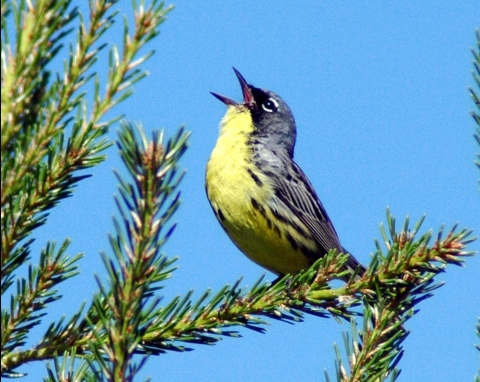What We Do
We work with others to restore wildlife habitat and populations, including though endangered species recovery efforts. Our office reviews hundreds of project plans within Michigan each year so planners can move forward while meeting the requirements of several federal laws. We work to understand and make the public whole for damages caused to natural resources from the release of environmental contaminants. We administer certain grants and provide technical assistance, including through our Coastal Program.
Threatened and Endangered Species
Our responsibilities under the Endangered Species Act include conserving declining species before listing is necessary, working to recover listed species and cooperating with other Federal agencies and partners to conserve endangered species.
Environmental Contaminants
Environmental contaminants specialists evaluate the impact of environmental contaminants on fish, wildlife and their supporting ecosystems. We work to prevent, reduce and eliminate the adverse effects of environmental contaminants. We work with others to clean up and restore areas that have been impacted by the release of contaminants. Our contaminants specialists provide technical assistance during spill response and pursue restoration through Natural Resource Damage Assessment and Restoration (NRDAR) for natural resources injured by the discharge of oil or release of hazardous substances into the environment.
Oil Spills and Hazardous Substance Releases
Environmental contaminants specialists work closely with response agencies to avoid or minimize negative effects to natural resources through pre-spill planning and through collaboration during spills and remediation activities.
Natural Resource Damage Assessment and Restoration
Through the U.S. Department of the Interior's Natural Resource Damage Assessment and Restoration (NRDAR) program, we analyze and restore natural resources injured by the discharge of oil or release of hazardous substances into the environment. Our contaminants specialists collaborate with trustees and partners to perform scientific studies that inform negotiations to reach legal settlements with responsible parties. Funds from financial settlements are used to directly restore injured sites and species and compensating the public for their loss of natural resources. For more details about NRDAR cases in Michigan, visit our Projects and Research page.
Project Planning
Through early and thoughtful planning, we work to conserve fish, wildlife and their habitats by providing technical assistance on activities such as Corps of Engineers’ projects and permits, state (Environment, Great Lakes, and Energy) permits, energy development (transmission lines, hydro and wind power), communication tower construction, transportation and urban development.
Grants and Conservation Planning Assistance
We administer Endangered Species Act grants to provide funding to states, tribes, organizations and individuals for listed species conservation activities. We also work with others to restore Great Lakes coastal habitats through our Coastal Program.
At the very heart of the Great Lakes, Michigan contains the largest U.S. percentage of the basin’s shoreline, watershed, islands and tributaries, along with many other landscape features important to sustaining populations of trust resources. The world’s premier freshwater system supports an impressive array of migratory birds, fish and other aquatic species, imperiled species and game and nongame wildlife. Conserving these resources is pivotal to achieving the Service’s mission.
Our Services
We offer a handful of services to support plant, fish, and wildlife conservation - especially federal threatened or endangered species. Different services are tailored to different groups and situations, so if you want to proactively support imperiled species conservation on your property or if you wonder how federally-protected plants and animals may factor into your situation, explore the services we offer.
Laws and Regulations
Under several federal laws, Congress has directed the U.S. Fish and Wildlife Service to be stewards of our nation's plant, fish, and wildlife resources - particularly animals like birds and fishes that cross state and even international borders; federal threatened and endangered species; and the National Wildlife Refuge system - the system of federal lands dedicated to wildlife conservation. Congress has similarly directed the Fish and Wildlife Service to work with other federal agencies to minimize or eliminate negative impacts to plants, fishes, and wildlife from projects they fund or authorize. Learn more about the laws that direct our work.

